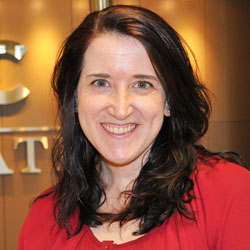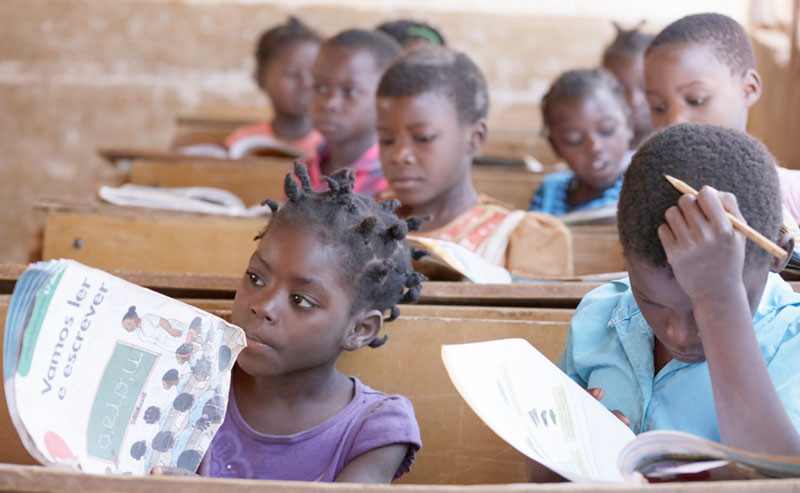Closing the literacy gap in Mozambique
By Natalie LovenburgMarch 20, 2018
A Q&A with multilingual education expert Corrie Blankenbeckler
Among children who finish primary school in Mozambique, nearly two-thirds leave the education system without basic reading, writing and math skills.
Corrie Blankenbeckler wants to change that.
As Senior Associate for Instructional Systems and Governance at Creative Associates International, Blankenbeckler currently manages the USAID-funded Let’s Read! (Vamos Ler! in Portuguese), which supports the Mozambican government to improve the reading and writing skills of children in first, second and third grades through literacy materials in local languages.

The program is simultaneously supporting oral language skills in Portuguese to prepare students for the transition from their local languages to the national language in grade 4. Creative implements the program with the World Education, Inc., American Institutes for Research, Overseas Strategic Consulting and Blue Tree Group.
At the annual Comparative and International Education Society (CIES) conference March 25-29 in Mexico City, Blankenbeckler will explain how her program is working to change the outcomes for Mozambican students through more effective materials in local language, effective teacher training and systems supporting in a complex multilingual context.
In this Q&A, she shares insights on the importance of bilingual education and creating optimal learning in complex environments.
For a full schedule of Creative’s CIES 2018 panels, including panelists, times and locations, click here. Follow @1977Creative and #CIES2018 on Twitter for up-to-date coverage.
What is the relationship between the language of instruction in early grade education and children’s learning outcomes in general and in Mozambique particularly?
Blankenbeckler: I often get asked the question: “Why bilingual education in Mozambique?” and then there’s a follow-up statement about how students and adults should be learning Portuguese or English, but certainly not in the local language.
My response to this question is that the goal isn’t necessarily for students to learn the local language, it is for them to have the opportunity to learn in their local language so they can fully express themselves and master essential reading and writing skills. After this literacy foundation is built, then students can learn multiple languages.
In the context of Mozambique, children have not been learning to read for several reasons, including poor curriculum design, lack of access to printed materials or unqualified teachers. Students also lack literacy skills because there’s a disconnect between the language of students speak at home and in the community, and the language of instruction, Portuguese, which most Mozambicans don’t speak at home or in their communities.
How does multilingual education unlock student learning and development?
Blankenbeckler: I often say, reading is rocket science. Of course, it’s not rocket science, but it is a science. Learning to read combines a critical set of skills that are acquired and learned, and this learning process shapes the future of every person.
Literacy skills are affected by exposure to print, such as a road sign or printed books, and accessing these materials in your mother-tongue language is foundational to bridging the gap between literacy and non-literacy. For young children, learning how to read in a familiar, local language can be the key to success.
Literacy is a foundational skill that contributes to building other early grade skills such as math. The “Mathew Effect” shows that if children don’t acquire reading skills, such as distinguishing letters and sounds at a very young age, they often stagnate in learning and eventually dropout of school.
Brain development at a young age is crucial for a child’s continuous, lifelong learning. Cognitive skills begin to form when children start putting sound and words together to communicate. Building on early brain development by creating books in the local language and being able to read and interact with text in the local language is so beneficial for these young learners.
How does the Let’s Read! program support early grade students to overcome language barriers in the classroom?
Blankenbeckler: In the classroom setting, children need to fully understand what is being communicated from their teacher, especially in the early grades. Through Let’s Read!, children in grades 1 to 3 learn to read in their local language but also receive a 45-minute lesson on oral Portuguese every day. In this way, children develop their reading skills in the local language and over time can transfer these skills to learn to read Portuguese. By the time students reach grade 4 and transition to learning in the national language entirely, they have had the opportunity to practice, learn and speak the national language.
To support the children’s cognitive development outside of the classroom, the project recently launched an activity called “Let’s Talk,” where parents and their children use their own language to practice building oral language skills through conversation.
In this activity, parents learn the importance of engaging with their children in more “nutritious talk”, and children learn how to speak with other peers and adults, to ask questions, and reflect together on their world. Parents are often illiterate but the project works with “Agents of Change,” or community facilitators, who provide the tools to engage in quality conversation through demonstration.

What helped shape the design of the Let’s Read! program?
Blankenbeckler: In the beginning, the project conducted three mixed methods studies with a select sample of schools and communities. We conducted a language mapping study to better understand which local languages were being spoken in the schools and communities. We also conducted a community engagement and teacher educator studies to learn more about parent, teacher, and educator attitudes toward education in general, with a keen focus on bilingual education.
Through interviews, we aimed to understand how many languages each student spoke and the frequency they used the language in daily conversations. Most children said they were bilingual or trilingual on paper but when they were assessed through a verbal evaluation, the result was most children were not fluent in multiple languages.
We spoke with educators, parents and other community members. Most indicated that they preferred children to learn in Portuguese, since it’s the national language and they believe speaking Portuguese is a path out of poverty and provides great economic opportunities.
However, the studies showed that even in non-bilingual programs, teachers use the local language for young students to understand what’s being taught, since comprehension in Portuguese is very poor. More than 90 percent of the teachers that we interviewed said they use the local language to get their students up to speed. Overall, the communities felt education in their villages was not effective.
Let’s Read! went inside communities in all districts, asked questions and tried to gauge the level of acceptance the new curriculum and policy. And we received positive feedback from teachers, students and other community members excited for the new bilingual education program.
By conducting ongoing, annual classroom assessments we will help ensure learning is on track and the bilingual education approach is effective.
What support from the government is needed to implement multilingual education programs like Let’s Read! and to be sustainable long-term?
Blankenbeckler: In the early 1990s, the Ministry of Education in Mozambique launched an optional bilingual education program, which leveraged 16 local languages throughout schools nationwide. Parents had the option to choose bilingual education, with local language instruction alongside Portuguese in the early grades, or the monolingual program, only learning in Portuguese. The program has been implemented in fits and starts, with little support and no formalized curriculum. Even so, as a result, there has been a strong push to standardize the 16 languages by having an orthography, formalize spelling of words, etc.
The optional bilingual program has not been consistent or effective across the various districts with diverse environments. This is due in part to an unstructured approach to learning to read in the early grades.
Let’s Read! offers a structured approach to early grade reading, with focus on reading in the local language with transfer of acquired skills in later year to Portuguese. In close partnership with the Government of Mozambique, focused on formalizing a policy that required bilingual education in every school in the target districts in which Let’s Read! operates. As of July 2017, bilingual education is required in each school.
Together, we are designing reading and writing standards and establishing a National Reading Framework. This effort would assist in unifying different parts of the country and paving the way to making bilingual education a national priority.
A result of the civil war in Mozambique, many teachers did not receive a quality education, which has translated to ineffective teaching approaches. To address teacher placement and training challenges, the project is working closely with the Ministry to directly train teachers in the new reading approaches and match teachers and students who speak the same language.
Armindo Ngunga, Ph.D, Vice-Minister of the Ministry of Education and Human Development, who is a linguist and former language professor, has played a key role in standardizing languages and helping the bilingual education program move forward.
Having a supportive Ministry of Education that understands the importance of bilingual education has been essential. The Ministry has taken ownership of the bilingual education curriculum development and teacher placement, which speaks to the sustainability of the project.

